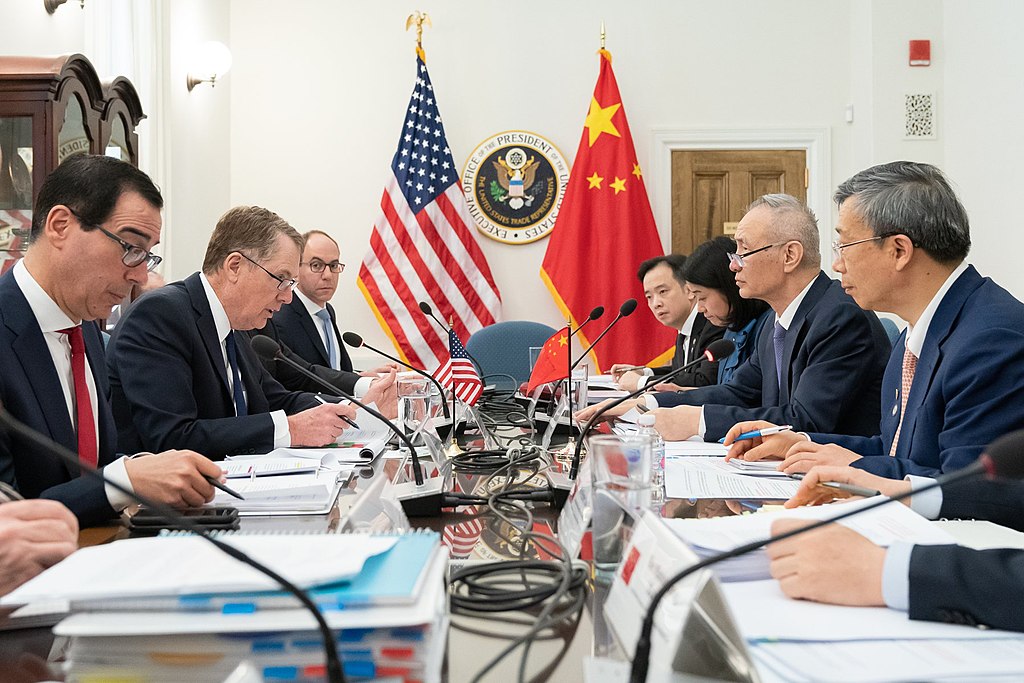U.S., China to Resume Trade Talks, but Obstacles Remain
U.S., China to Resume Trade Talks, but Obstacles Remain

U.S., China to Resume Trade Talks, but Obstacles Remain
The announcement last week that the United States and China would resume trade talks in October sent stocks up, but many obstacles remain before a deal is in sight. The two sides announced last week that Vice Premier Liu He, who has been leading the talks on the Chinese side, would travel to the United States for negotiations with U.S. Treasury Secretary Steve Mnuchin and U.S. Trade Representative Robert Lighthizer. Deputies from both the United States and China will also speak later this month in preparation for the negotiations.
Liu’s trip will resume talks after a recent rough patch in the bilateral relationship, triggered by the announcement in August of new tariffs to be imposed by both sides. A 15 percent tariff from the United States on $300 billion of goods has already gone partially into effect and will be completed on Dec. 15. U.S. tariffs are also set to increase from 25 percent to 30 percent on $250 billion of Chinese goods in October, just before the negotiations take place.
Trade talks foundered in May after Chinese negotiators retreated on certain issues. The disputes centered predominantly on three points identified by Liu: whether the United States would remove tariffs that it had imposed as part of the trade war; the need for “balanced” language in the ultimate deal; and the aims for Chinese purchases required to address the bilateral trade imbalance. Prior to May, it appeared that the two sides had made some progress toward addressing intellectual property protection and technology transfer—central issues in the negotiations—but disputes over cybertheft and regulation of the digital economy are likely to remain sticking points.
New challenges have also emerged since the last round of negotiations in July. In particular, the ongoing protests in Hong Kong could influence the discussions: The political upheaval has introduced a new source of friction in the U.S.-China relationship that could cast a pall over the talks. Both the United States and China have also failed to fulfill pledges made in June, including China’s commitment to purchase American soybeans and U.S. waivers for companies to sell parts to Huawei, the Chinese telecommunications giant that was recently placed on the Department of Commerce’s Entity List. Last week, the Chinese government indicated it would be willing to purchase additional agricultural products from the United States, but such an offer could depend on what concessions the U.S. is willing to make.
Despite the looming difficulties, Mnuchin recently struck an optimistic tone about the talks, noting on Fox Business that the upcoming negotiations are “a sign of good faith that they want to continue to negotiate” and that the two sides “at least have a conceptual” agreement when it comes to enforcement. But how far that “good faith” will take U.S. and Chinese negotiators remains to be seen.
German Chancellor Angela Merkel Visits China
German Chancellor Angela Merkel mounted an official visit to China from Sept. 6 to Sept. 7. This was Merkel’s 12th visit to China but the first from a major Western leader since protests broke out in Hong Kong in June. Merkel was accompanied by a delegation of 25 key German business leaders, including executives from Siemens and Volkswagen.
Unsurprisingly, much of Merkel’s conversation with her Chinese counterparts focused on the countries’ bilateral economic relationship. On Friday, Merkel met with Chinese Premier Li Keqiang and President Xi Jinping, telling Li that Germany remains open to business with China even, according to Bloomberg, “as her government raises barriers to investments in sensitive areas” such as advanced technologies. Merkel returned from her trip with no fewer than 11 cooperation agreements. The trip seems to have been a success for Merkel’s Chinese counterparts as well, with Chinese state media heralding the trip. China Daily commented that “the two countries have vast space for cooperation” and cast Merkel as “one of the Western political leaders that know[s] China the best.”
Maintaining a healthy bilateral economic relationship has taken on special importance for Germany in light of the U.S.-China trade war. China has been Germany’s “biggest trading partner for the past three years,” according to the South China Morning Post (SCMP), but Germany’s economy shrank 0.1 percent from April to June and the New York Times has suggested that the German economy is “hurtling towards recession.” During her meetings with Li, Merkel explicitly argued that the U.S.-China trade war had an “adverse effect on other countries.”
Broadly speaking, European Union countries have refused to adopt President Trump’s confrontational approach toward China, even though they share many of the same concerns about China’s economic policies. Merkel has publicly advocated for a European investment deal with Beijing and intends to host an EU-China summit in 2020. There is no consensus on China policy within the EU, however. The EU Commission earlier this year described China as a “systemic rival,” while Germany has emphasized that China is a “global economic partner.” Still, the fact remains that even powerful European economies like Germany have resisted Trump’s embrace of tariffs and have instead sought a third way in dealing with China.
Despite her focus on economic issues, Merkel also raised the topic of Hong Kong with Li, stressing that “the rights and freedoms of the people of Hong Kong must be guaranteed” and that “solutions can only be found in dialogue.” Li responded that Beijing would safeguard the one country, two systems arrangement with Hong Kong but reaffirmed Beijing’s support for the Hong Kong government’s efforts “to end the violence and chaos in accordance with the law.” In advance of Merkel’s visit, U.S. Ambassador to Germany Richard Grenell had called on Merkel to speak up on the Hong Kong protests and “take a firm stance for the values that unified Germany after the fall of Communism.”
Hong Kong activist Joshua Wong also penned an open letter for the German daily Bild, noting that Merkel “grew up in East Germany” and experienced firsthand “the horrors of a dictatorial regime.” He also called on the chancellor to express concern about the “catastrophic situation.” On the Monday immediately following Merkel’s trip, Wong met with German foreign minister Heiko Maas at a soirée hosted by Bild and publicly called on the “free world to stand together … in resisting the Chinese autocratic regime.” Beijing slammed the meeting as “disrespectful” and castigated “German media and politicians” for attempting to “tap into the anti-China separatist wave.”
Commentary
- The National Interest reports that China activated one of its “Soar Dragon large spy drones to keep tabs on a U.S. Navy cruiser that sailed through the Taiwan Strait in late July 2019.” Back in 2016, China Daily ran a feature on the drone, which is produced by Guizhou Aviation Industry Group and is “suitable for long operations at high altitude.” Seven of these drones have been observed thus far. The National Interest noted that Beijing’s “years of investment in drones are finally starting to pay off” but that it could take many years for China to build up the requisite human capital. It takes nearly 200 pilots, maintainers and analysts to “support a single sortie by a high-end UAV [unmanned aerial vehicle].”
- As Nikkei reports, major Cambodian telecommunications companies have chosen to partner with Chinese companies in rolling out 5G services. Both the Malaysia-based Smart Axiata and the Cambodian telecommunications company Cellcard intend to go live with “5G commercial services before the end of the year.” Smart has opted to use Huawei technology. Cellcard, which intends to launch its 5G service in December, has constructed 5G base stations in Phnom Penh, Siem Reap, and Sihanoukville and has chosen ZTE for the initial rollout.
- The People’s Bank of China (PBOC) has released more information about China’s proposed new digital currency, which the SCMP casts as a rival to Facebrook’s Libra. As Reuters reports, WeChat and Alipay users will be able to use the currency. Mu Changchun, deputy director of PBOC’s payments department, argued that the development of the currency would “help protect [the] country’s foreign exchange sovereignty.” Mu also said that the digital currency would be “based on the blockchain technology that underpins crypto-currencies.”
Commentary
A new report by James A. Lewis at the Center for Strategic and International Studies proposes “an incremental and flexible approach to technology transfer” from the United States to China going forward. In the Council on Foreign Relations’s Net Politics blog, Jason Healey lays out five security arguments for keeping Huawei out of U.S. 5G infrastructure. A new video from the Center for a New American Security explains the different facets of the investments made by Chinese companies as part of the Belt and Road Initiative.
On the trade war front, Michael B. Greenwald analyzes the ways the Chinese government has begun to pressure foreign companies—particularly airlines—for not adhering to certain rules set by the Chinese government, such as including Taiwan on maps under a separate name. In Project Syndicate, Raghuram G. Rajan explores the ways the U.S.-China trade war has created lasting damage to the fundamental principles underlying the postwar global economic system. Finally, in the New York Times, Nicholas Kristof considers whether a war between the United States and China could begin with a cyberattack on Taiwan.
For Lawfare, Alex Stamos imagines a worst-case scenario of election interference in the 2020 presidential election, including the potential for involvement by the Chinese Ministry of State Security in such interference. Stamos also appears on a bonus episode of the Cyberlaw Podcast to discuss Chinese election interference in Taiwan. Kyle Langvardt and Alan Rozenshtein analyze a set of three bills recently proposed by Republican Sen. Josh Hawley, including one bill that would require platforms regulated by Section 230 of the Communications Decency Act to prove that they are not engaged in political censorship. On the Lawfare Podcast, Margaret Taylor and Tom Wheeler, the former chairman of the Federal Communications Commission, discuss the need to rethink how we approach the cybersecurity challenges associated with 5G networks. This week’s Cyberlaw Podcast also delves heavily into China-related issues including disinformation in Hong Kong, the decoupling of tech supply chains, and websites programmed to distribute iPhone malware.




.jpg?sfvrsn=818c05df_5)

